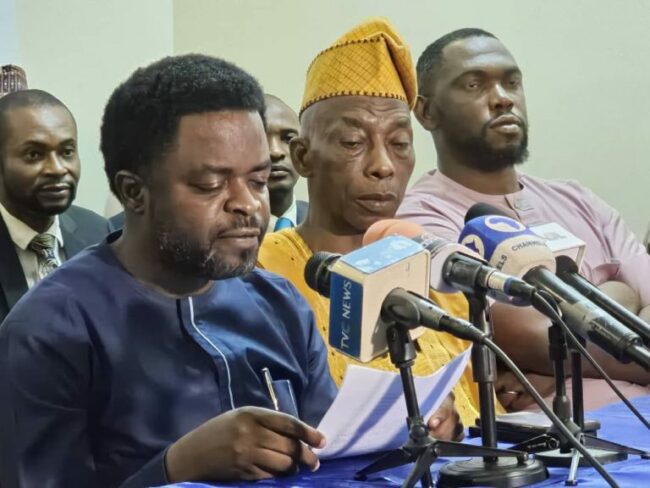Civil society organisations (CSOs) and human rights lawyers have called on the Economic and Financial Crimes Commission to save the image of Nigeria by not prioritising political battles that are counterproductive to the robust anti-corruption policy of President Bola Tinubu’s administration.
The scores of activists and lawyers, under the broad umbrella of the Committee for the Defence of Democracy and Rule of Law, particularly noted that the seeming fixation of the anti-graft agency on particular targets, the fierce media trial, and the network of opposition figures publicly displaying their affinity with the Commission on particular matters easily reflected political hatchet jobs that must be discouraged.
The Co-Convener of the Committee, Barrister Kayode Mogbojuri, who spoke on behalf of the CSOs at a press conference in Abuja on Sunday, said the EFCC could not afford to become a tool of political witch hunt in the hands of every disgruntled politician seeking political retribution against opponents or perceived enemies and advised the Chairman, Ola Olukoyede, to shut out real enemies of the Commission.
“For instance, the way it (the EFCC) is handling the current corruption allegations against the immediate past Governor of Kogi State, Yahaya Bello, is becoming a case of clear political witchcraft by his political opponents, for whom the EFCC seems to be a ready tool to be manipulated into fighting their proxy wars.
“In every country where the fight against corruption has been politicised, corruption has not only thrived but also imploded. Policy and law enforcement should be water and oil that cannot mix,” he stated.
The activists further stated that the amended charge read that the former governor committed the said offence sometime in September 2015, when he had not even become governor, and revealed that it was a hurried attempt to nail the ex-governor without due diligence.
The CSOs also made reference to the EFCC’s statement that the former governor was at large, noting that it was evidence of political persecution, considering the fact that there had been no prior publication that he had been invited.
“First, the EFCC is attempting to stand the rule of law on its head by violating a clear court order that it has yet to vacate by a counter-court order. The High Court of Justice, Lokoja Division, has given a restraining order on the EFCC to stay any action either to arrest, prosecute, or persecute the former governor or any of his appointees pending the hearing and determination of the substantive originating motion for the enforcement of his fundamental human rights.
“The EFCC may not agree with that order, but it cannot violate it unless the subsisting order is vacated…The question is: why the desperation to disobey an unambiguous and subsisting court order if political persecution is not involved? Corruption cannot fight corruption. There is no greater corruption than disrespecting an express order by a court of competent jurisdiction,” the activists said.
According to them, the slant of the EFCC’s operations, if not checked, could attract unnecessary local and international suspicion as to the real intentions of the Commission if it becomes obvious that it is tending towards political persecution rather than legal prosecution and trampling on the sacred principles of the rule of law.
“No sensible Nigerian would oppose the fight against corruption considering its horrible effects on the socio-economic well-being of the country. It is a phenomenon that must be decisively fought, no doubt. We support the anti-corruption drive of the current administration of President Bola Ahmed Tinubu, which has clearly stated and so far demonstrated its total intolerance for corruption of any sort.
“However, the agencies constitutionally charged with fighting corruption must have to avoid fighting corruption with corrupt means of political compromises and means that are against it, as this will surely run counterproductive to the robust anti-corruption policy of the Tinubu administration.”
“We advise the Commission to leave politics to politicians and concentrate on professionalism and the delivery of its constitutional anti-corruption mandate without political pollution, which has the potential to make it lose local and international support,” the activists concluded.
ALSO READ THESE TOP STORIES FROM NIGERIAN TRIBUNE
